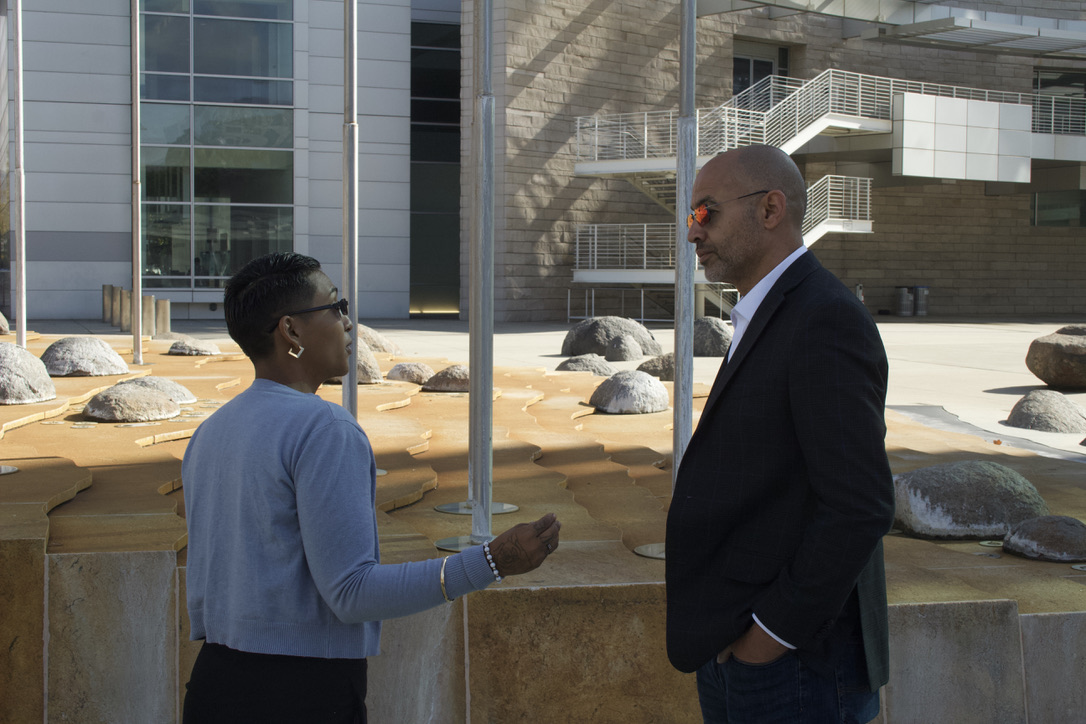
Dylan Newman
Yari Castillo, left, speaks with District 10 councilmember George Casey on her experiences as an RV owner outside San José City Hall on Tuesday afternoon.
RV owners in San José who rely on their vehicles for shelter are facing a series of issues finding a place to park their homes as winter approaches.
Yari Castillo, an RV owner a part of a group of 21 RVs in San José, said her group is being targeted by the city as they have been swept out of their fourth location in the span of less than one month.
She arrived at San José City Hall on Tuesday in hopes of creating a line of dialogue between her group and San José Mayor Matt Mahan, but instead ended up in conversation with District 10 Councilmember George Casey outside The Janet Gray Hayes Rotunda.
“I think he understood because I said, ‘Why are you so opposed to a partnership with the community?’ ” Castillo said. “We want to contribute something.”
Castillo said she wants a safe place for her community to park their vehicles, and the working-class families that make up her group are willing to pay the city rent for a space.
On Aug. 18, the city began sweeping Columbus Park off West Taylor Street and Spring Street, which had the 370 unhoused people who were residing there evicted from the park, according to a Sept. 16 Spartan Daily article.
The group is facing eviction today from the parking lot of the closed Almaden Valley Transportation Authority (VTA) station, which is within the limits of Casey’s district, according to an Oct. 13 Mercury News article.
Casey met with Castillo for roughly ten minutes, as the councilmember invited her across the street to speak while ordering coffee.
Castillo said that the conversation gave her the opportunity to speak about her community.
“We’re not homeless,” Castillo said. “We are un-parked.”
An issue being faced by RV owners is that the city has spent $3.3 million on its Oversized and Lived-In Vehicle Enforcement (OLIVE) program, which bans RVs from being parked in designated areas across the city, according to an article from January by San José Spotlight.
The city offered unhoused residents of Columbus Park $2000 for their RVs and a stay in temporary housing, according to the Spartan Daily article.
At least two individuals died in the park in August, according to the same source.
Castillo said the temporary motels the city is using to house unhoused residents don’t have kitchens, split up families and can have strict rules for visits within at least the first 100 days.
She said immigrant families like her own and within her community, not having a kitchen like the one in her RV is simply unfeasible.
“They make their own food and that’s the best part of it,” Castillo said. “We’re not asking for shelter and we don’t want to surrender our shelter because we bought it — how are you going to take something that we bought? Is that even legal?”
Of the 370 unhoused individuals from Columbus Park, 198 were housed and 121 vehicles were removed from the park, according to the mayor’s week 4 progress update post published on Instagram.
The Spartan Daily reached out to Mayor Matt Mahan to learn more about any possible plans of granting these individuals a parking lot to reside in but did not receive a response in time for publication.
A community organizer with the organization Human Empowerment, Radical Optimism Tent (H.E.R.O.) who asked to be anonymously identified as Abdullah said that he learned that a member of an unhoused community died on the street near City Hall Tuesday from the cold weather.
He also said he was arrested while helping unhoused individuals at Columbus Park during the sweeps.
“They threw me on the hood of the car to arrest me as well as my friend,” Abdullah said. “This just plays into this attempt at optics of looking like we solve the issue by just putting all these unhoused individuals out of sight and giving the illusion that we are making progress or we’re solving anything, but we’re just being hostile to unhoused people and harming them further.”
H.E.R.O Tent is a 501(c)3 non-profit organization that provides mutual aid to unhoused people, according to its website.
Casey said that some of the residents at the Almaden site have accepted motel options and that the city is still buying back a number of their RVs.
“This was the same option that was offered to them while they were at Columbus Park,” Casey said. “A number of them, for reasons of their own, some of them didn’t think they’d be able to eat the food that they like, for example and cook the food they like at the site we were offering now.”